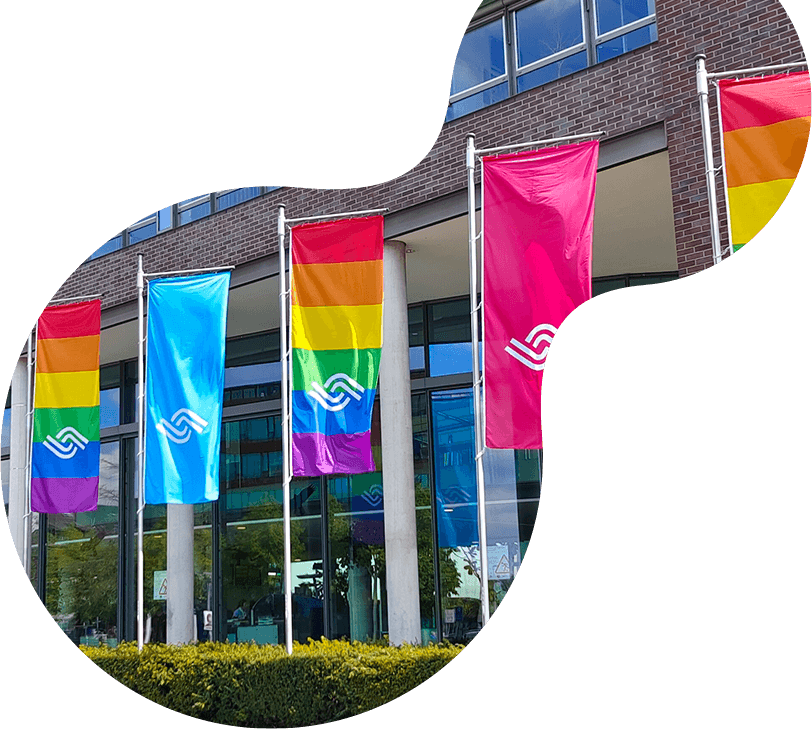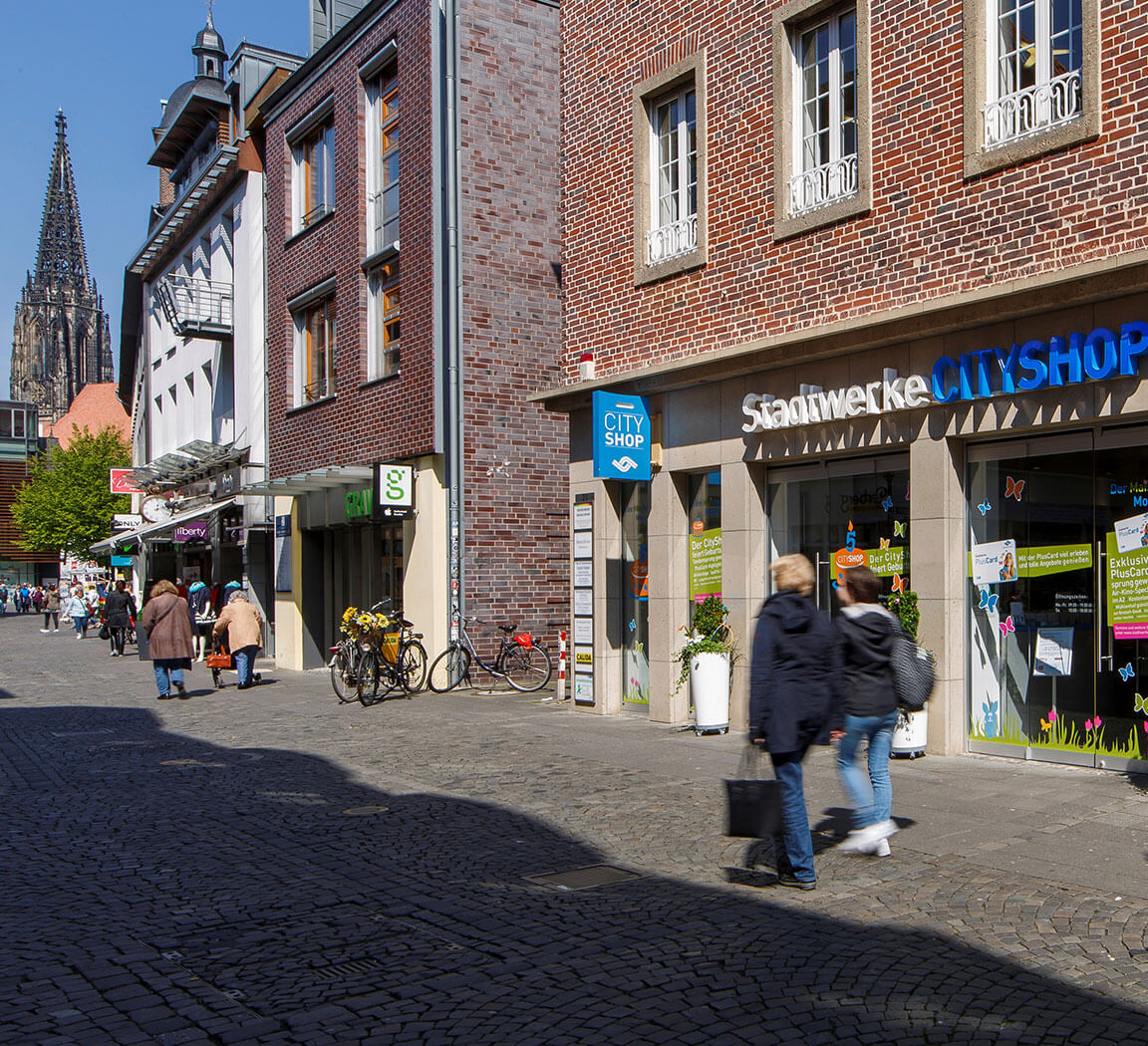Success Story
Stadtwerke Münster
Unique customer view through consolidation of data sources.
- Creation of a standardized customer view by merging different sources
- Creation of a central hub for customer master data
- Increase in data quality

Success Story

#STORY
Stadtwerke Münster has been closely associated with Münster and its inhabitants for over 120 years. Starting out as the municipal gas, electricity and water works, Stadtwerke has been supplying the city since 1901. With more than 1,400 employees, the municipal company, which is wholly owned by the city of Münster, plays a central role in implementing the energy and mobility transition. Its business areas are energy and water supply, electricity generation, mobility and fiber optics.
The topic of data quality is particularly important at Stadtwerke Münster. Stadtwerke employees are aware of the relevance of data quality and know how important customer master data of an appropriate quality is for the company's public image. However, manual processing is always an error-prone method through which errors can find their way into the systems. It is important that a system identifies the weak points and that employees can take direct countermeasures.
In addition to the desire for a system to manage and process customer master data, the IT infrastructure at Stadtwerke is currently under review, including an upcoming switch to a new CRM system in the future. This upcoming system change has also led to special attention being paid to customer master data. By merging different business areas and the master data available there, the need for a uniform customer view has increased.
The aim was to create a central location to manage, prepare and process customer master data; this cleansed data should also be able to be enriched from external sources. The Münster-based energy supplier set out to find a solution that could serve as a central hub for customer master data from different systems.
„Stadtwerke Münster sees Uniserv's Customer Data Hub as a central component of its IT architecture.“
Britta Becker, Market Communication and Monitoring & Dominik Bleckmann, Data Analytics, Stadtwerke Münster

Image source: Stadtwerke Münster
#SOLUTION
Due to the impending upheaval in Stadtwerke Münster's IT infrastructure, important questions arose at the start of the project. In order to get to grips with the variety of customer master data and to be able to handle data more easily, the goals set out at the beginning were to make everyday work easier and to gain an overview of the customer master data. The collaboration between the municipal utilities and Uniserv began through a recommendation. It quickly became clear that the Customer Data Hub (CDH) tool met the requirements of the municipal utilities.
In order to test the CDH, the joint project began with a proof of concept (POC). The first questions to be answered were "How does the tool fit into the IT landscape that we are currently setting up?" and "Does it create a uniform customer view?". In addition, the objectives "Elimination and avoidance of data that is no longer used, simple migration of data, creation of a uniform customer view and return of data to the individual systems" were to be reviewed.
The POC initially started with minor challenges relating to the existing data model and the mapping of customer relationships and business partners. These issues were quickly resolved. For example, it became apparent that the current systems are not very regulated when it comes to entering customer data, which in turn means that the entries are more prone to errors.
It also quickly became clear that the CDH can also answer open questions about the data model thanks to its connection to the various systems. Customer relationships and storage locations can be easily and clearly mapped in the CDH, allowing questions such as "Where is the customer stored?", "What roles does the customer have?",
"Is the customer stored in the subscription model?" or "Does the customer have a Stadtwerke Moments card?" to be answered quickly and easily. All these aspects were already considered during the POC and initial evaluations were carried out.
Two data sources were connected during the POC in compliance with data protection regulations. The first was SAP CRM and a single sign-on system from the mobility platform. The project was therefore able to map the existing data quality very well. In addition, further data quality issues were uncovered that would not have been noticed without a tool for checking.
In cooperation with Uniserv, the data was initially prepared in a structured manner, and the existing data quality was analyzed and improved through follow-up questions and clear communication on the part of Uniserv. The POC was the ideal solution for Stadtwerke Münster.
As part of the project, all CDH functions were first presented in a workshop. A scheme was then drawn up with questions and recommendations on how the project could be approached. It was then decided who the testers for the project should be on the part of Stadtwerke Münster, which test cases should be included and how the results should be presented.
In conclusion, Stadtwerke Münster can say that the CDH is easy to use and offers a good overview at first glance. Thanks to the comprehensive dashboard and monitoring, all data records are always at a glance and can be processed immediately.
#SUCCESS
Overall, the POC leaves a more than positive impression. The project was handled smoothly. The challenges faced by Stadtwerke Münster were presented very clearly for processing. In addition, further data issues have already become apparent in the POC, which Stadtwerke Münster will deal within the follow-up.
The project quickly made it clear that the issues of data quality and data protection need to be considered together. It also became clear that the relationship that the municipal utilities have with their business partners is very relevant for an overview of the customer master data. The extensive data analysis presented this information clearly and were therefore very helpful.
The CDH acted as a control center for the data in the POC. The data was loaded into the hub from the various systems of the municipal utilities and could be analyzed and processed there. The CDH therefore makes work much easier. On the one hand, the tool provides a direct insight into the data. Secondly, employees no longer have to go to the individual systems to obtain evaluations.
In the follow-up project, the CDH is to be extended to all municipal utilities. It has not yet been decided which systems will be connected. A large number of systems are in use at Stadtwerke Münster. These will almost certainly include SAP for Utilities, the new CRM system and transport and subscription systems. Other systems can also be integrated into the CDH in the future if required.
At Stadtwerke Münster, these were the most popular CDH functions:
In general, Stadtwerke Münster sees great added value in the high data quality that is ensured with the CDH. This plays a central role, particularly in view of the fact that the diversity of customer data is constantly increasing and numerous new source systems are being added at energy suppliers.

Image source: Stadtwerke Münster
Stadtwerke Münster faces the challenge of managing customer data centrally
Customer Data Hub (CDH) supports the optimization of customer data management and data quality
CDH's proof of concept (POC) clearly shows data problems and provides valuable insights into data quality.
CDH is to be extended to the entire company, offering functions such as data merging and cleansing, name analysis and a clear dashboard and monitoring.
Improved data quality leads to better customer service and customer relationships, strengthens reputation and provides valuable added value in the rapidly evolving energy industry.

Stadtwerke Münster has been closely associated with Münster since 1901. Founded as a municipal gas, electricity and water company to ensure supplies to the people of Münster, today Stadtwerke Münster supplies electricity, heat, drinking water, fiber optic internet and offers a wide range of mobility solutions. They develop modern solutions and infrastructures for a digitalized and climate-neutral Münster. The Münster team consists of over 1,400 employees.
You might also be interested in: